This website uses cookies so that we can provide you with the best user experience possible. Cookie information is stored in your browser and performs functions such as recognising you when you return to our website and helping our team to understand which sections of the website you find most interesting and useful.
Legendary Birmingham rocker Ozzy Osbourne made a surprise appearance to bring the curtain down on a hugely successful Commonwealth Games in fabulous fashion.
Osbourne and his band Black Sabbath received a rapturous ovation from the 30,000 capacity crowd at the Alexander Stadium as they provided a fitting climax to a star-studded closing ceremony.
The 73-year-old 'Prince of Darkness' has not performed for several years due to ill health.
"I love you, Birmingham - it's good to be back!" he shouted as he rose through the stage to round off the show with classic hit Paranoid.
The Earl of Wessex, Prince Edward, officially declared the Games closed after the flag handover to Victoria, the Australian state that will host the 2026 edition.
"Thanks to the manner, style and enthusiasm with which you have competed, officiated, supported organised and volunteered, you have once again brought the spirit and values of the Commonwealth Games to life," he said.
"You have inspired us and hopefully future generations - you have also demonstrated what unites us. Thank you Birmingham and the West Midlands."
Earlier, other famed Brummie acts including Dexys Midnight Runners, Apache Indian, Musical Youth, UB40 and Panjabi MC entertained the crowd with classic hits amid a parade featuring hundreds of athletes who competed during the 11-day Games.
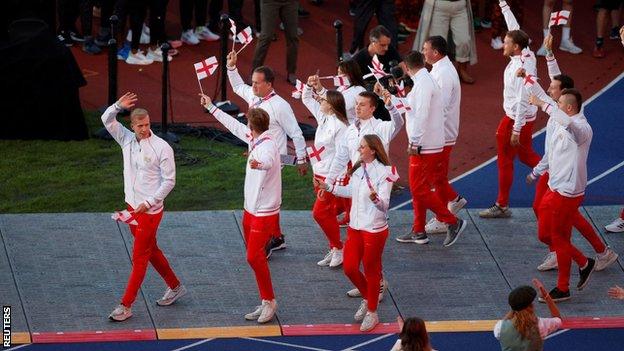
Team England, who collected a record 176 medals during the Games, were the last to enter the stadium to a euphoric reception from the home supporters.
More than 1.3 million tickets were sold during the Games across 24 sports - with organisers estimating that more than 500,000 of those were snapped up by West Midlands residents who took the event to their hearts.
That extended not only to those who attended the sports themselves but also hundreds of thousands more who packed festival sites at event venues and other city landmarks to enjoy the action on big screens, meet the Perry the Bull mascot and soak up the atmosphere.
More than 4,500 athletes from 72 nations and territories competed in 280 medal events across 11 days, yielding a host of fantastic feats, stirring stories and memorable moments.
With the sun shining virtually throughout the week and a half in the West Midlands, the weather played its part too and that continued with a closing ceremony bathed in warm evening temperatures.
One of the ceremony's loudest ovations was reserved for Games organising committee chair John Crabtree's heartfelt speech, thanking the 14,000 volunteers for their efforts and the crowds for their support.
He also praised the seamless way disability sports had been integrated into Birmingham 2022, which featured the largest Para-sports programme in Commonwealth Games history.
"I think Birmingham should be so, so proud, they have put on an incredible Games," five-time Paralympic gold medallist Ellie Simmonds, from nearby Walsall, told BBC Sport.
"Sport has the power to change the world and you can see it in Birmingham."
Closing ceremony to remember
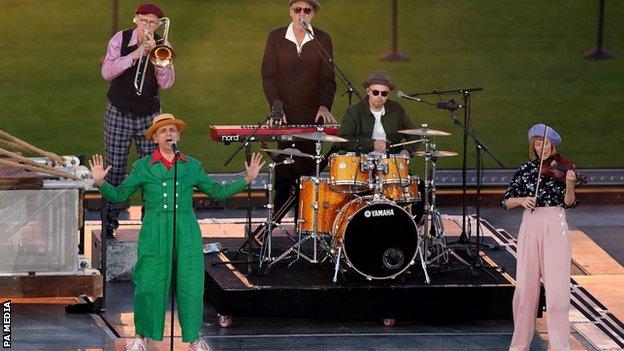
The closing ceremony began with a huge chimney soaring up from the stage, signifying Birmingham's industrial history and post-war rebuild, before cult 1980s band Dexys Midnight Runners got the crowd rocking with a rendition of their iconic hit Come On Eileen.
Birmingham's multi-cultural heritage, beginning with the arrival of Caribbean and Asian communities into the city in the 1950s and 1960s, was celebrated through performances of Apache Indian's Boom Shack-A-Lak and Musical Youth's Pass The Dutchie.
That theme of the Second City's diverse communities continued as reggae legends UB40's Red, Red Wine was followed by model Neelam Gill making an appearance during Panjabi MC's Bhangra hit Mundian To Bach Ke.
Musicians from the wider West Midlands including Goldie, Beverley Knight - the soul singer wearing a Wolverhampton Wanderers kit - and Jorja Smith also performed during a glittering ceremony.
Of course, Birmingham would not be Birmingham without a nod to the ever-popular Peaky Blinders TV drama via a dance routine, which preceded a powerful segment featuring some of the area's young spoken word and musical talents foreshadowing the city's - hopefully bright - future.
The handover to Victoria for the 2026 Games, where the host nation promises to deliver the "first true multi-city Commonwealth Games" across several cities, was followed by Australian songs and choreography, before Osbourne produced the surprise of the night with his unexpected finale.
Fitting flagbearers as Games stars take centre stage
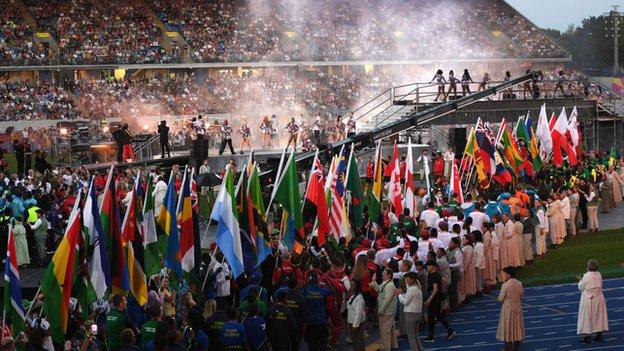
A fortnight ago, Jake Jarman was a virtually unknown young gymnast preparing for his first major senior championship - four gold medals later, he's almost a household name at the age of 20.
Jarman's nomination as England's flagbearer for the closing ceremony reflected not only his leap from obscurity to stardom, but also the host nation's unparalleled gymnastics success at the Games.
The 11 gold medals England's gymnasts won was unsurpassed by any other sport, with triumphs for hometown favourites Joe Fraser and Alice Kinsella adding to the Arena Birmingham crowd's fervour.
From Alex Yee's scene-setting triathlon gold on the Games' opening morning, through emotional comebacks from cyclist Laura Kenny and swimmer Adam Peaty, there were individual stories aplenty.
But the team events provided just as much drama, not least England men's thrilling overtime 3x3 basketball final triumph against Canada and the women's hockey final victory over Australia.
In a Games that, for the first time, featured more medals for women than men, double medallist Eilish McColgan was chosen as Scotland's flagbearer after the women's 10,000m champion and Laura Muir provided the golden highlights of their nation's athletics efforts.
And success in the boxing ring - always a strong suit for the home nations - was reflected by Rosie Eccles and Dylan Eagleson carrying the Wales and Northern Ireland flags respectively.
A Games to treasure for host nation
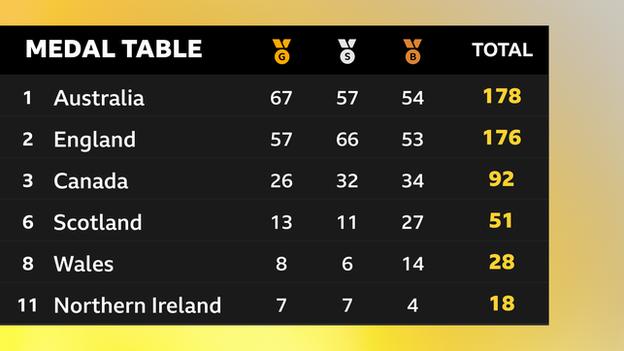
Away from the action, the Games captured the imagination of a region and a nation - but they were just as successful from a sporting point of view for the host country.
England enjoyed their best ever Commonwealth Games medal tally of 176, beating the haul gained at Glasgow 2014 by two, although the 57 golds won were one shy of the 58 claimed eight years ago.
Even that terrific total was not enough for England to repeat their 2014 feat of topping the medals table as Australia took that honour by virtue of 10 more golds and two more medals overall.
It was a Games to remember for the other home nations too, with Northern Ireland recording their largest Commonwealth medal return and Scotland registering their second highest.
Scotland finished sixth in the medal table with their 51 medals and 13 golds, second only to their home Games tallies of 53 and 19 respectively at Glasgow 2014.
Northern Ireland's 18 medals and seven golds were both new records, beating marks set last century, while Wales enjoyed their fourth-best Commonwealth Games with 28 medals.
There was joy too for Guernsey as the Channel Island claimed its first Commonwealth medals in 28 years with Lucy Beere's lawn bowls silver and Alastair Chalmers' men's 400m hurdles bronze.
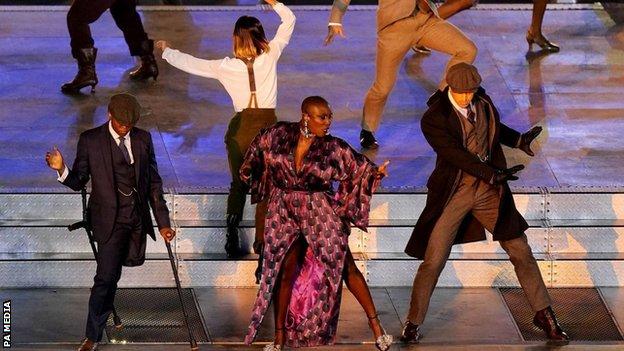
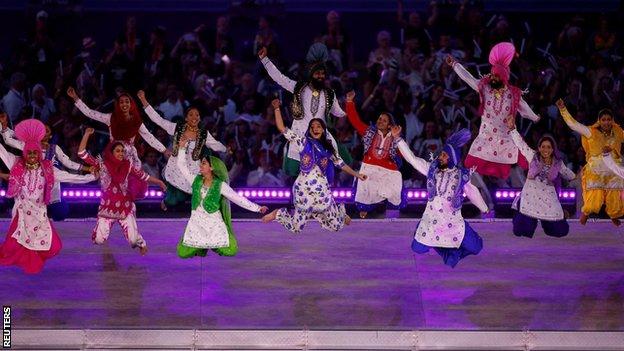
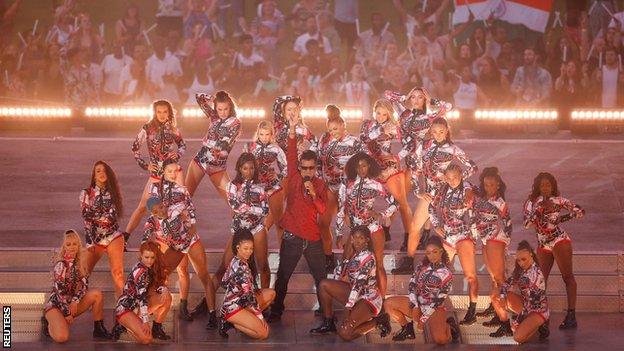



 Africana55 Radio
Africana55 Radio 
